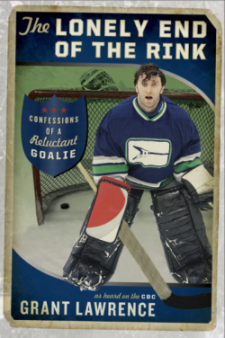The Lonely End of the Rink
By Grant Lawrence
Published by Douglas and McIntyre
240 Pages (plus recommended reading, recommended listening, and thank yous), $26.95
Reviewed by Michael Luis
We all know the cliché of jock vs. nerd, but perhaps no more than Grant Lawrence. The 42-year-old CBC Radio personality from Vancouver details this social war in his second book, The Lonely End of the Rink.
The Lonely End of the Rink details Lawrence’s journey to love hockey all the way from his first slippery stumbles on the ice as two-year-old, to his successful run in Vancouver’s premier beer-league in his late 30s. While this makes up the majority of the narrative, Lawrence also weaves in the tale of his hometown team, the Vancouver Canucks, providing an in-depth history of their start as a 1970s expansion team, up to the 2011 Stanley Cup series.
Lawrence focusses on his relationship with grade-school bullying for the early portion of his personal narrative. Lawrence deftly describes these bullies (with names like Buck, “Psycho”, and “Gooch”): “Gooch was a Shrek-shaped hillbilly originally from the small town of Horsefly, BC.”(95).
The stories of how these bullies - almost all hockey players - treated Lawrence are gut-wrenching and portray Lawrence as an underdog we can back. “He threw my bag in the direction I was running as hard as he could…the side of my skull cracked against the thin layer of waxed linoleum covering the hallway’s concrete floor like a snooker ball being struck by a baseball bat” (73)
Lawrence’s language is simple and modest with light metaphors. While many of the metaphors are vivid and concrete, such as the snooker ball and bolas, many of them reference pop-culture, like referring to “Gooch” as “Shrek-shaped”. Considering Lawrence’s position as a media personality, their inclusion makes perfect sense. While the metaphors serve as quick referential humour, the volume of references - some of which being overly specific - can be exhausting. Some were hilarious, such as describing the bizarre opening act for Lawrence’s band The Smugglers as “a Pink Floyd-meets-The Lord of the Rings pagan rock nightmare” (119), but many felt forced and unnecessary, such as the description of “Breaking Bad-esque science-teacher glasses” (17). That being said, I laughed out loud at most.
In terms of the second narrative of the Canuck’s history, Lawrence effectively includes the information that best compliments his personal journey. For example, he focusses on the Canucks’ famous goalie trio of “King” Richard Brodeur, “Captain” Kirk Mclean, and Roberto “Bobby Lu” Luongo. Lawrence was always enamoured by the goalie position, even when disliking hockey as a teen. Since the personal narrative explores many of Lawrence’s failures, it’s no fluke that he examines the Canucks’ three Stanley Cup losses; from the optimism following the 1982 runner-up team, to the brutal riots of 1994 and 2011.
Whereas the Canucks have yet to return to the finals and achieve redemption, by the end of book’s 240 pages, Lawrence achieves his. The book is a tale of falling down on the ice, brushing yourself off, and popping back up. It’s about learning to love what you once hated, and realizing why you love what you already do. The Lonely End of the Rink’s memoir-meets-arts-meets-sports fusion isn’t as game-changing as Orr and Gretsky were, but it’s a unique personal take on our nation’s greatest passion, and definitely worth strapping on some skates for.
Michael Luis is a Victoria student, writer, filmmaker, and musician. Check him out at www.michaelacluis.wordpress.com.

{ 0 comments… add one now }